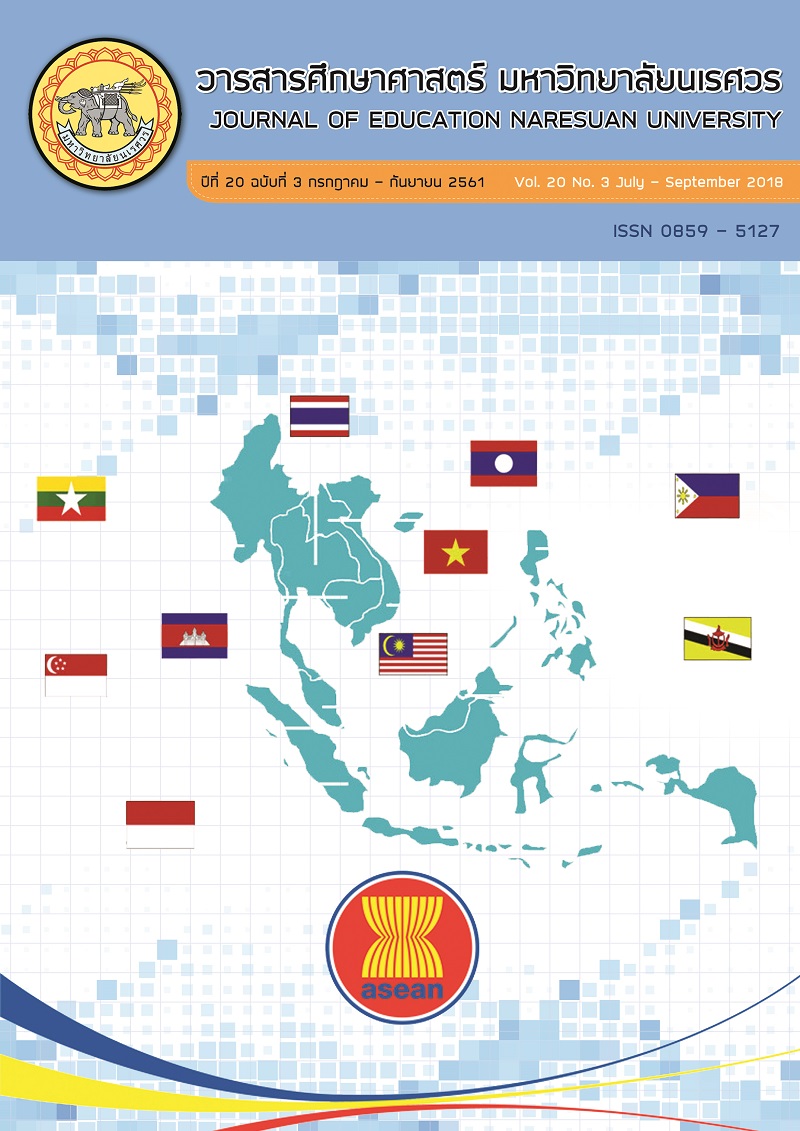การศึกษาผลสัมฤทธิ์ทางการเรียน มโนทัศน์ทางวิทยาศาสตร์ และเจตคติต่อวิชาเคมี เรื่อง เชื้อเพลิงซากดึกดำบรรพ์และผลิตภัณฑ์ ของนักเรียนชั้นมัธยมศึกษาปีที่ 6 ด้วยการจัดการเรียนการสอนตามแนวทฤษฎีคอนสตรัคติวิซึม; THE STUDY OF ACHIEVEMENT, SCIENCE CONCEPTS AND ...
Main Article Content
Abstract
การศึกษาครั้งนี้มีวัตถุประสงค์เพื่อศึกษาผลสัมฤทธิ์ทางการเรียน มโนทัศน์ทางวิทยาศาสตร์และเจตคติต่อวิชาเคมี โดยการสอนตามแนวทฤษฎีคอนสตรัคติวิซึม กลุ่มตัวอย่างที่ใช้ในการวิจัยครั้งนี้ ได้แก่ นักเรียนชั้นมัธยมศึกษาปีที่ 6 โรงเรียนแห่งหนึ่งในจังหวัดชลบุรี ภาคเรียนที่ 2 ปีการศึกษา 2558 ที่ได้จากการสุ่มแบบกลุ่ม 1 ห้องเรียน จำนวน 34 คน เครื่องมือที่ใช้ในการวิจัยได้แก่ แผนการจัดการเรียนรู้โดยการจัดการเรียนการสอนตามแนวทฤษฎีคอนสตรัคติวิซึม เรื่อง เชื้อเพลิงซากดึกดำบรรพ์และผลิตภัณฑ์ แบบทดสอบวัดผลสัมฤทธิ์ทางการเรียน แบบทดสอบวัดมโนทัศน์ทางวิทยาศาสตร์ และแบบวัดเจตคติต่อวิชาเคมี ซึ่งวิเคราะห์ข้อมูลโดยเปรียบเทียบความแตกต่างของคะแนนวัดผลสัมฤทธิ์ทางการเรียน มโนทัศน์ทางวิทยาศาสตร์ กับเกณฑ์เกณฑ์ร้อยละ 70 โดยใช้
การทดสอบค่าทีแบบกลุ่มตัวอย่างเดียว (t-test One Sample) และเจตคติต่อวิชาเคมีก่อนและหลังเรียน โดยใช้การทดสอบค่าทีแบบสองกลุ่มสัมพันธ์กัน (Paired t-test) ผลการวิจัย พบว่า ผลสัมฤทธิ์ทางการเรียน และมโนทัศน์ทางวิทยาศาสตร์ของนักเรียนชั้นมัธยมศึกษาปีที่ 6 โดยการจัดการเรียนการสอนตามแนวทฤษฎีคอนสตรัคติวิซึม สูงกว่าเกณฑ์ที่กำหนดคือร้อยละ 70 อย่างมีนัยสำคัญทางสถิติที่ระดับ .05 และเจตคติต่อวิชาเคมีหลังเรียนสูงกว่าก่อนเรียนอย่างมีนัยสำคัญทางสถิติที่ระดับ .05
THE STUDY OF ACHIEVEMENT, SCIENCE CONCEPTS AND ATTITUDE TOWARD CHEMISTRY ON FOSSIL FUEL AND PRODUCTS OF GRADE 12 STUDENTS USING CONSTRUCTIVISM
The purpose of this research was to study learning achievement, science concepts and attitude toward on chemistry using Constructivism. The samples for this research consisted of 34 grade twelve students from a School in Chonburi Province in the second semester of academic year 2015. The Cluster Random Sampling method was used in an experiment group. The research instruments were the lesson plans on the topic of Fossil fuel and Products, science achievement test, science concepts test and attitude toward chemistry test. The data were analyzed by comparing the different score of an achievement and science concepts with the criterion of 70 percent using one sample t-test and comparing the difference of attitude toward chemistry scores pretest and posttest using paired t-test. The research findings were showed that the posttest science learning achievement and science concept of grade twelve students after using Constructivism was higher than a defined criteria of 70 percent at .05 level of significant. The posttest attitude toward chemistry of grade twelve students after using Constructivism was higher than those before the test pretest at .05 level of significant.
Article Details
The owner of the article does not copy or violate any of its copyright. If any copyright infringement occurs or prosecution, in any case, the Editorial Board is not involved in all the rights to the owner of the article to be performed.
References
Bhudtiyatanee, S. (2006). Educational measurement (5th ed.). Kalasin: Prasan Printing. (in Thai)
Chaiyarn, T. (2002). A comparison of learning achievement on human mechanism between constructivist teaching strategies based on underhill and the traditional approach (Master thesis). Khon Kaen: Khon Kaen University. (in Thai)
Driver, R., & Bell, B. (1986). Students thinking and the learning of science: A constructivist view. School Science Review, 67(240), 443 – 456.
Hongladarom, T. (2004). Problem-based learning as a student-centered learning. Bangkok: Book Net. (in Thai)
Institute for the Promotion of Teaching Science and Technology. (1989). A document of inquiry-based teaching. Bangkok: Kurusapa Printing Ladphrao. (in Thai)
Kagan, S. (1994). Cooperative leaning. San Juan Capistrano: Resources for Teach.
Katunyou, S. (1999). The effect of teaching science based on constructivist approach on science learning achievement of Prathomsuksa five students (Master thesis). Bangkok: Chulalongkorn University. (in Thai)
Khammani, T. (2004). Pedagogy: knowledge for effective learning processes. Bangkok: Chulalongkorn University. (in Thai)
Krendl, K. A. (1986). Media influence on learning: Examining the role of preconceptions. Educational Communication and Technology, 34, 223-234.
Laohapaibul, P. (1994). Teaching science in secondary schools. Chiang Mai: Chiangmai Commercial. (in Thai)
Lertlop, W. (2000). A comparison of learning outcomes among teaching/learning approaches based on learning cycle model, IPST model and learning cycle - IPST model (Doctoral dissertation). Bangkok: Srinakharinwirot University. (in Thai)
Likitponrak, W. (2013). A comparative study of scientific attitudes of upper secondary students in science-mathematics program in the second semester, academic year 2556, Silacharaphiphat school under the Bangkok secondary educational service area office 1 (Research report). Bangkok: Silachanphiphat School. (in Thai)
Lord, T., H. Travis, B. Magill, & L. King. (2002). Comparing student-centered instruction in college biology labs. Retrieved November 23, 2015, form http://k12sPhast.umass.edu/steemtec/pathways/Preceedings/Lord-p.doc
Maneetip, W. (2006). Effects of cooperative learning on science knowledge application in daily life and learning achievement of lower secondary school students (Master thesis). Chiang Mai: Chiang Mai University. (in Thai)
Ministry of Education. (2008). The basic education core curriculum B.E. 2551. Bangkok: Kurusapa Printing Ladphrao. (in Thai)
Munkham, S. (2004). Strategies for teaching analytical thinking (2nd ed.). Bangkok: Parbpim. (in Thai)
Naiyapatana, O. (2005). Quantitative and Qualitative Research Methodologies. Bangkok: Srinakharinwirot University. (in Thai)
Namnimitranon, N. (2014). Problem-based learning to promote scientific reasoning on basic chemistry 10th grad students (Master thesis). Chonburi: Burapha University. (in Thai)
Office of the Education Council. (2003). National education act B.E. 2542 (1999) and amendments (second national education act B.E. 2545 (2002). Bangkok: Pimdeekarnpim. (in Thai)
Phamolsilapatham, J. (2008). The development of vocational certificate students ‘scientific conceptions on the petroleum and polymer by inquiry based approach (Master thesis). Bangkok: Kasetsart University. (in Thai)
Pookduang, P. (1999). The effect of constructive teaching approach on learning achievement in science (Master thesis). Khon Kaen: Khon Kaen University. (in Thai)
Riyapa, R. (2007). A study of attitudes toward science of student with different learning achievements in mathayomsuksa II, Thetsaban Chammathewi School. Lamphun: Chamathewi Municipal School. (in Thai)
Rodrangka, W. (1998). Constructivism. IPST Magazine, 26(101), 7-12. (in Thai)
Saiyod, L, & Saiyod, A. (2000). Learning measurement techniques (2nd ed.). Bangkok: Suweeriyasarn. (in Thai)
Seanpan, W. (2010). Knowledge of science and process of learning design in science. Bangkok: Ramkhamhaeng University. (in Thai)
Taweerat, P. (2000). Research methodology in behavioral sciences and social sciences (7th ed.). Bangkok: Srinakharinwirot University. (in Thai)
Visiwong, D. (2007). A comparison of learning achievement in science strand entitled "substance and its property" of Prathomsuksa six students taught by constructivist instruction and tradional instruction (Master thesis). Pathum Thani: Valaya Alongkorn Rajabhat University. (in Thai)
Wonganutrohd, P. (2010). Personnel management psychology. Bangkok: Bangkok Supplementary. (in Thai)


